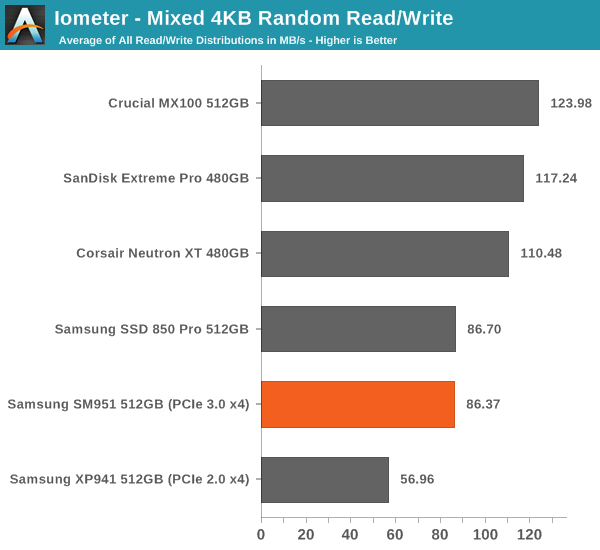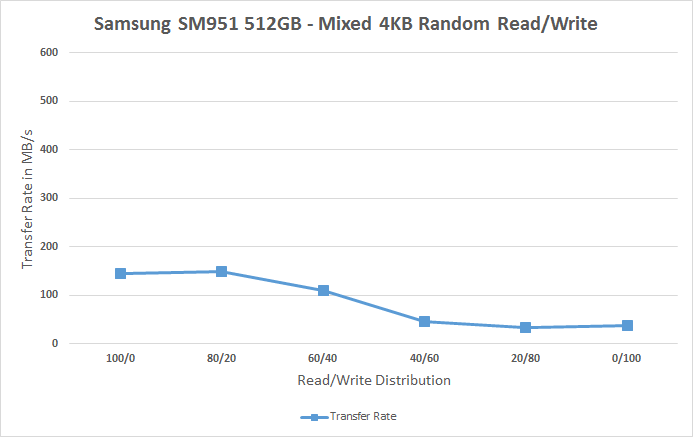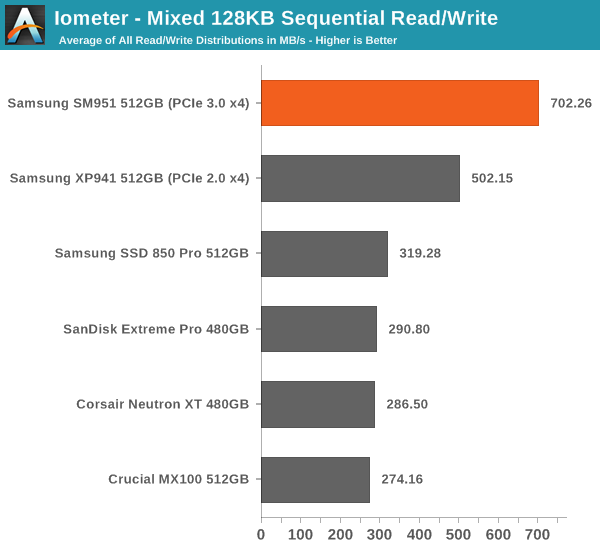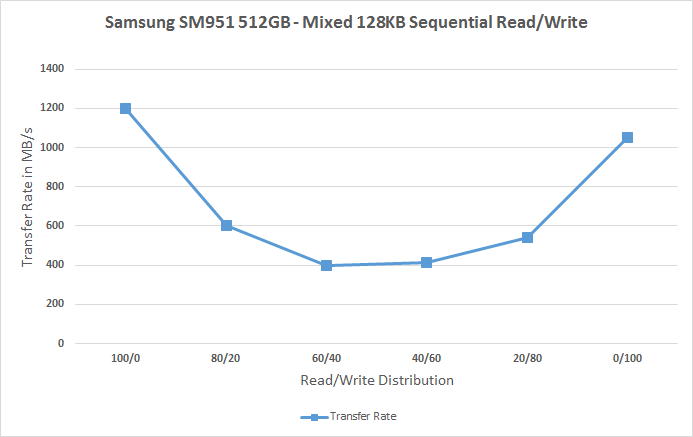Samsung SM951 (512GB) PCIe SSD Review
by Kristian Vättö on February 24, 2015 8:00 AM ESTMixed Random Read/Write Performance
Mixed read/write tests are also a new addition to our test suite. In real world applications a significant portion of workloads are mixed, meaning that there are both read and write IOs. Our Storage Bench benchmarks already illustrate mixed workloads by being based on actual real world IO traces, but until now we haven't had a proper synthetic way to measure mixed performance.
The benchmark is divided into two tests. The first one tests mixed performance with 4KB random IOs at six different read/write distributions starting at 100% reads and adding 20% of writes in each phase. Because we are dealing with a mixed workload that contains reads, the drive is first filled with 128KB sequential data to ensure valid results. Similarly, because the IO pattern is random, I've limited the LBA span to 16GB to ensure that the results aren't affected by IO consistency. The queue depth of the 4KB random test is three.
Again, for the sake of readability, I provide both an average based bar graph as well as a line graph with the full data on it. The bar graph represents an average of all six read/write distribution data rates for quick comparison, whereas the line graph includes a separate data point for each tested distribution.

Quite surprisingly the SM951 and Samsung drives in general don't do very well with mixed data.
 |
|||||||||
The reason lies in the fact that the performance of Samsung drives plummets when the share of writes is increased. At 80/20 read/write, the Samsung drives manage to do pretty well, but after that the performance declines to about 40MB/s. What's odd is that the performance is also bad with 100% writes, whereas with other drives we usually see a spike here. I'm guessing there's some garbage collection going on here that causes the performance degradation.
Mixed Sequential Read/Write Performance
The sequential mixed workload tests are also tested with a full drive, but I've not limited the LBA range as that's not needed with sequential data patterns. The queue depth for the tests is one.

With 128KB sequential data, however, the SM951 is the king of the hill. There's a clear difference between PCIe and SATA based drives, although it's worthy to note that the difference is mostly due to PCIe drives having much higher throughput at 100% reads and writes (i.e. the infamous bathtub curve).
 |
|||||||||










128 Comments
View All Comments
blanarahul - Tuesday, February 24, 2015 - link
Can't wait to see what Intel brings to the table considering the amount of focus they put on consistency.extide - Tuesday, February 24, 2015 - link
I'm not sure that we will see anything too interesting client side from them. They seemed to have moved all their focus to the enterprise side, which is of course where the bulk of the money is.FWIW, Intel already has a PCIe SSD that is arguably faster -- the Intel SSD DC P3700
dylan522p - Tuesday, February 24, 2015 - link
Is, not arguablyStuka87 - Wednesday, February 25, 2015 - link
It is faster, and certainly more reliable. Intel has the best enterprise SSDs on the market.FunBunny2 - Wednesday, February 25, 2015 - link
-- Intel has the best enterprise SSDs on the market.Among consumer facing companies, perhaps. The real enterprise SSD/flash players are largely unknown to AnandTech and its readers.
monsted - Wednesday, February 25, 2015 - link
I'd love to see the results of a HDS FMD compared to the usual suspects.Kristian Vättö - Wednesday, February 25, 2015 - link
We've had this conversation before and I'll tell you this again: the majority of flash array vendors are using SSDs from Intel, SanDisk, Samsung and others. There are some that design and build their own drives/blades (e.g. Violin and Skyera), but the vast majority is using third party drives as the heart of their flash arrays.GTVic - Wednesday, February 25, 2015 - link
All drives now should support eDrive.Railgun - Tuesday, February 24, 2015 - link
At the rate I'm going, I'll end up with one of these before my XP941 ever gets powered up once, retail or otherwise.Laststop311 - Tuesday, February 24, 2015 - link
Disappointed in lack of 1TB size/ no 3d vnand/ no nvme. I planned on using 1 of these in 1TB size for a boot drive for a skylake-e build. The good news is I have a couple years for samsung to fix those issues.